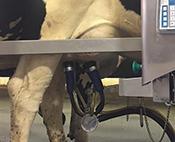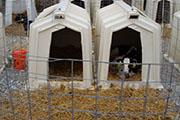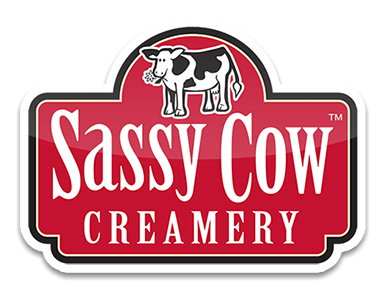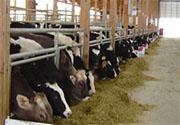|
Brought to you by Dairy's Professional Development Organization®
|
|
Opportunities to learn...
ACE ON-THE-FARM TWILIGHT MEETINGS
SET FOR AUGUST. Four dairy farms will host a tour and meeting for c
ommunity leaders and dairy producers to discuss issues important to our rural communities and economies. The program begins each evening at 6:00 p.m. starting with a 60-minute tour of the hosting dairy and followed by open dialogue and ice cream. The meetings are a joint program of the Wisconsin Counties Association, Wisconsin Towns Association and the Professional Dairy Producers, and are open to the public. Learn more - including host farm addresses, and register here. Hosting dairies include:

- Monday, August 28, Brooks Farms near Waupaca, Wis.
- Tuesday, August 29, Mar-Bec Dairy near Mondovi, Wis.
- Wednesday, August 30, Cozy Nook Farm near Waukesha, Wis.
- Thursday, August 31, Ripp's Dairy Valley near Dane, Wis.
MINIMIZING THE EFFECT OF WEATHER ON CALVES will be the focus of a World Class Webinars, Wednesday, Sept. 27 from noon to 1 p.m. CT. Dr. Geof Smith of North Carolina State Univ. will discuss approaches and options to combat stressful weather transition from hot summer to the chilly, damp fall for calves. It will provide both practical and creative solutions for housing, labor, nutrition and calf management. Register
here
or contact 800-947-7379. Participants who have registered can watch the sessions live and will receive a fully-recorded version to watch at their leisure.
 SAVE THE DATE: FINANCIAL LITERACY COURSES, LED BY DR. DAVID KOHL
are on tap beginning October 23-24. The inaugural class of PDPW Financial Literacy for Dairy will provide dairy farmers and allied industry the knowledge base and financial acumen needed to successfully and confidently make daily, annual and long-term strategic decisions for their dairy business. The first session, to be held in Madison, Wis., will be limited to 30 attendees and include 4 two-day sessions in October, December, January, and April. Learn more
here
or contact PDPW at 800-947-7379 or
mail@pdpw.org
to register. SAVE THE DATE: FINANCIAL LITERACY COURSES, LED BY DR. DAVID KOHL
are on tap beginning October 23-24. The inaugural class of PDPW Financial Literacy for Dairy will provide dairy farmers and allied industry the knowledge base and financial acumen needed to successfully and confidently make daily, annual and long-term strategic decisions for their dairy business. The first session, to be held in Madison, Wis., will be limited to 30 attendees and include 4 two-day sessions in October, December, January, and April. Learn more
here
or contact PDPW at 800-947-7379 or
mail@pdpw.org
to register.
|
For your dairy...
 PRODUCERS CAN REDUCE MILKING TIME AND RISK OF OVERMILKING
by increasing the milk-flow rate when removing the milking unit, according to research in the Journal of Dairy Science. Researchers studied the effects of three take-off levels (0.06, 0.3, and 0.48 kg/minute) on milking time, milk yield, the degree of udder emptying, milk composition, and free fatty acids. The study was done on cows in an Automated Milking System in groups of cows where treatments were applied for one week each. The results indicated that milking time could be reduced without losing milk yield or compromising milk composition or udder health when takeoff levels were set to 0.48 kg/minute at the udder quarter level. Read the full study
here
. PRODUCERS CAN REDUCE MILKING TIME AND RISK OF OVERMILKING
by increasing the milk-flow rate when removing the milking unit, according to research in the Journal of Dairy Science. Researchers studied the effects of three take-off levels (0.06, 0.3, and 0.48 kg/minute) on milking time, milk yield, the degree of udder emptying, milk composition, and free fatty acids. The study was done on cows in an Automated Milking System in groups of cows where treatments were applied for one week each. The results indicated that milking time could be reduced without losing milk yield or compromising milk composition or udder health when takeoff levels were set to 0.48 kg/minute at the udder quarter level. Read the full study
here
.
 INCORPORATING ON-FARM CULTURING IN HERD HEALTH PROTOCOLS can be valuable to a dairy operation in many ways. While the primary use for on-farm culturing has been to identify the causes of mastitis and determine treatment options, an article from Penn State Extension shares other applications. For example, conducting a periodic check on the effectiveness of a farm's pasteurizer for waste milk fed to calves can be beneficial. Research conducted in Canada also demonstrated the value of on-farm applications to determine whether Escherichia coli was present in the uterus of the cows and to track the occurrence of puerperal metritis in cows that were positive for the bacterium. Read more and find details on these applications here
. INCORPORATING ON-FARM CULTURING IN HERD HEALTH PROTOCOLS can be valuable to a dairy operation in many ways. While the primary use for on-farm culturing has been to identify the causes of mastitis and determine treatment options, an article from Penn State Extension shares other applications. For example, conducting a periodic check on the effectiveness of a farm's pasteurizer for waste milk fed to calves can be beneficial. Research conducted in Canada also demonstrated the value of on-farm applications to determine whether Escherichia coli was present in the uterus of the cows and to track the occurrence of puerperal metritis in cows that were positive for the bacterium. Read more and find details on these applications here
.
 EVALUATING GROUP-HOUSING OPTIONS BY USING INDIVIDUAL CALF HUTCHES
EVALUATING GROUP-HOUSING OPTIONS BY USING INDIVIDUAL CALF HUTCHES was the goal of researchers in a Journal of Dairy Science study. They compared behavior and performance of calves raised individually or in pairs with their own individual hutch, and found similar weight gain and milk intake for both groups. Paired calves were observed interacting and spending time together including lying in the same hutch. Individual calves spent more time lying outside the hutch, presumably to be able to see other calves. The study demonstrated that paired housing with individual hutches is a suitable alternative to individual housing outdoors and a good use of existing resources. Read more
here.
|
Hit the road...

SASSY COW CREAMERY
W4192 Bristol Rd., Columbus, Wis.
Owned and operated by James and Robert Baerwolf and their families
Enjoy milk or one of 29 flavors of ice cream at Sassy Cow Creamery in addition to a large variety of Wisconsin cheeses, chocolates and other treats. Learn more on their
Facebook page and
website.
|
 CONSUMERS' SHIFT AWAY FROM SUGAR WILL HAVE LONG TERM EFFECTS CONSUMERS' SHIFT AWAY FROM SUGAR WILL HAVE LONG TERM EFFECTS on the global food and beverage industry and the worldwide sugar market, according to research released by Rabobank in July. Authors noted key trends such as consumers focusing on low-sugar diets and increasing legislation to tax sugary soft drinks in many countries and U.S. cities.
The report concludes that the "rate of growth of global sugar consumption in the coming 15 years is likely to be lower than the growth rate seen in the last 15 years." Read more
here
.

BUILDING TRUST TO SECURE ACCEPTANCE OF GENE EDITING
is the top priority of many in agriculture and the food industry as the technology shows significant potential to make food healthier, more affordable and accessible. Charlie Arnot of the Center for Food Integrity shared five steps that the food industry must take to avoid the pitfalls and consumer distrust that have plagued GMO technology. The five steps include:
- Focus on benefits that consumers care about.
- Listen to consumers.
- Pull back the curtain.
- Don't treat consumers like they're ignorant and don't talk over them.
- Embrace skepticism.
Read the full guest article from Food Navigator USA
here
.
 RURAL BROADBAND REMAINS HOT TOPIC. However, the proposals come with a high price tag, estimated at $8 to $12 billion by Microsoft. A recent Janzen Ag Law blog post outlines challenges, options and how similar rural infrastructure programs were tackled in the past. The FCC estimates that 39 percent of rural Americans, or 34 million people, lack access to high speed internet. There are several technologies that are available, including fiber optic cables, white space technology, satellite internet and cell phone technology, but all bring their own challenges and potential depending on the area. Read more in this blog post
and a
Bloomberg News article. RURAL BROADBAND REMAINS HOT TOPIC. However, the proposals come with a high price tag, estimated at $8 to $12 billion by Microsoft. A recent Janzen Ag Law blog post outlines challenges, options and how similar rural infrastructure programs were tackled in the past. The FCC estimates that 39 percent of rural Americans, or 34 million people, lack access to high speed internet. There are several technologies that are available, including fiber optic cables, white space technology, satellite internet and cell phone technology, but all bring their own challenges and potential depending on the area. Read more in this blog post
and a
Bloomberg News article.
 AMAZON'S TAKEOVER OF WHOLE FOODS WILL SPUR GROCERY CHANGES.
While a
recent poll
reports that 43% of consumers who shop at Whole Foods Market and Amazon are happy about Amazon's proposed purchase of the retailer, the impact of the merger will have far-reaching impacts that will modernize the entire grocery industry and change consumer expectations. Industry analysts predict the industry will be more data-driven and provide more customer-centric options, including prepared meals, personalized recommendations, online ordering and delivery services, and speedier check-out services. Read more
here
. AMAZON'S TAKEOVER OF WHOLE FOODS WILL SPUR GROCERY CHANGES.
While a
recent poll
reports that 43% of consumers who shop at Whole Foods Market and Amazon are happy about Amazon's proposed purchase of the retailer, the impact of the merger will have far-reaching impacts that will modernize the entire grocery industry and change consumer expectations. Industry analysts predict the industry will be more data-driven and provide more customer-centric options, including prepared meals, personalized recommendations, online ordering and delivery services, and speedier check-out services. Read more
here
.
|
For your business mind...
 PREVENTING CONFLICT AND CREATING A LEVEL PLAYING FIELD are just a couple reasons to invest time in creating an employee handbook for your business. A handbook provides a clear introduction to your business policies and culture and helps speed the onboarding process for new employees. Key elements of a handbook include: PREVENTING CONFLICT AND CREATING A LEVEL PLAYING FIELD are just a couple reasons to invest time in creating an employee handbook for your business. A handbook provides a clear introduction to your business policies and culture and helps speed the onboarding process for new employees. Key elements of a handbook include:
- Recruitment and selection process
- Equal opportunities policy
- Dignity-at-work policy, which coves issues like bullying and harassment
- Procedures for discipline and grievance issues
- Rules around unauthorized absences
- A "code of conduct" with more general rules and guidelines specific to dairy farming and your operation
Read the
full article
for more information, including details on what should be included in an employee handbook compared to an employment contract.
 MANAGING REPLACEMENT HEIFER FEED COSTS IS KEY
to managing a dairy's bottom line. On Wisconsin dairy farms, the cost of raising dairy calves and replacement heifers can represent 15 to 20 percent of the total cost of milk production and feed costs make up more than one-half of the cost of raising replacements. UW-Extension has updated worksheets to assist farmers in managing and estimating the feed costs for replacement heifers. Learn more and download the worksheets
here. MANAGING REPLACEMENT HEIFER FEED COSTS IS KEY
to managing a dairy's bottom line. On Wisconsin dairy farms, the cost of raising dairy calves and replacement heifers can represent 15 to 20 percent of the total cost of milk production and feed costs make up more than one-half of the cost of raising replacements. UW-Extension has updated worksheets to assist farmers in managing and estimating the feed costs for replacement heifers. Learn more and download the worksheets
here.
WHAT HABITS SHOULD YOU BREAK TO BE A BETTER BOSS?
Gallup research in 2015 showed that about half of workers had left a job at some point to "get away from their manager." While most bosses aim to be fair, there are some working relationships that just work better than others, and human nature is to lean toward those relationships. However, playing favorites can mean missed opportunities for new perspectives, ideas and ways to solve problems. Here are six habits to break when working with your team:
- Going with who you know

- Picking youth over experience or vice versa
- Having one "go-to" person for everything
- Creating a hierarchy
- Being stingy with trust
- Preferring one style
For more details and tips on breaking each of this habits, read more
here
.
|
Meet a fellow PDPW dairy member....
 |
|
 |
Paul Lippert, Grass Ridge Farm |
Be good to your cows and don't settle for anything other than your best effort. The rest will take care of itself. That's the mindset at Grass Ridge Farm in Pittsville, Wis.
"In everything we do, we're asking ourselves if we can do better," says herdsman Paul Lippert. "When we think of growing our business, we focus on continuous quality improvement."
Along with his brother Carl and their father Matt, Paul runs this third-generation operation. While Carl manages crops, regulatory compliance and safety, Matt manages the financials, oversees all nutrition work and leads business strategy decisions. Paul serves as herdsman and manages human resources.
Grass Ridge employs 15 people, including six full-time milkers, two full-time feeders, and two full-time calf feeders. They milk 560 cows in a double-12 parallel parlor. Most are Holsteins, some are Jerseys, and all are registered within their breed association. Grass Ridge has a rolling herd average of 32,000 and they crop 1,400 acres of corn silage, haylage, tall fescue, alfalfa and some soybeans. Heifers and dry cows have some pasture available. All harvesting, manure hauling and tillage gets hired out.
"We focus on having healthy, comfortable cows and employing people who treat the cows well," says Paul. "Our cows enable us to strengthen our business year after year."
Genetics plays an important role in the health and productivity of their cows. All heifers are genomically tested in an ongoing effort to improve herd genetics. This enables Paul to know which animals to keep and which to sell should the pens get overcrowded.
"We use sexed semen in about the top 25 percent of heifers. We're looking to increase herd quality over time," Paul says. The most elite heifers are flushed utilizing traditional embryo transfer.
One avenue for continuous improvement is the dairy's membership in PDPW. Paul has been active in PDPW for about three years and plans to ramp up his involvement.
"When I attend events, I hear new things. I'm getting the latest in research, whether it's about reproduction, herd health, crop management or people management," he said. "PDPW does a really good job of finding new and exciting people. They also find speakers who aren't in the dairy business but have a message that applies to our industry."
Paul has attended the PDPW Business Conference twice so far. He recalls a presentation on human resources and the importance of employee handbooks and how to write them that equipped him with a complete protocol that improved his farm's processes and communications between management and employees.
|
"There is no doubt that creativity is the most important human resource of all. Without creativity, there would be no progress, and we would be forever repeating the same patterns." --- Edward de Bono
|
|
A BIG Thank You...
TO OUR PDPW SPONSORS who
support continuous improvement for the dairy industr
y.
T
hey believe in producer leadership and place a high value on lifelong
education for those involved in the dairy industry. We deeply respect their commitment to PDPW and the members we have the honor to serve.
continue to invest and build a strong industry. If you interact with any of these companies, please thank them for supporting PDPW!
If you or a company you know is interested in participating as a sponsor, please contact one of our team members at
abonomie@pdpw.org
or call 800-947-7379.
|
|
PDPW Education Calendar
| August 16 |
Dairy Dialogue Day Tour: Lodi, Wis. and Middleton, Wis.
|
| August 28 |
ACE Twilight Meeting: Brooks Farms near Waupaca, Wis.
|
| August 29 |
ACE Twilight Meeting: Mar-Bec Dairy near Mondovi, Wis.
|
| August 30 |
ACE Twilight Meeting: Cozy Nook Farm near Waukesha, Wis.
|
| August 31 |
ACE Twilight Meeting: Ripp's Dairy Valley near Dane, Wis
|
| September 27 |
PDPW World Class Webinars - Abating Weather-Related Stress in Dairy with Dr. Geof Smith - "Minimizing the Effects of Weather on Calves": Online
|
| January 16-18, 2018 |
2018 PDPW Managers Academy for Dairy Professionals: Orlando, FL
|
| March 14-15, 2018 |
2018 PDPW Business Conference "Dairying to Thrive": Madison, Wis.
|
STAY CONNECTED
800-947-7379
|
|
|
|
|